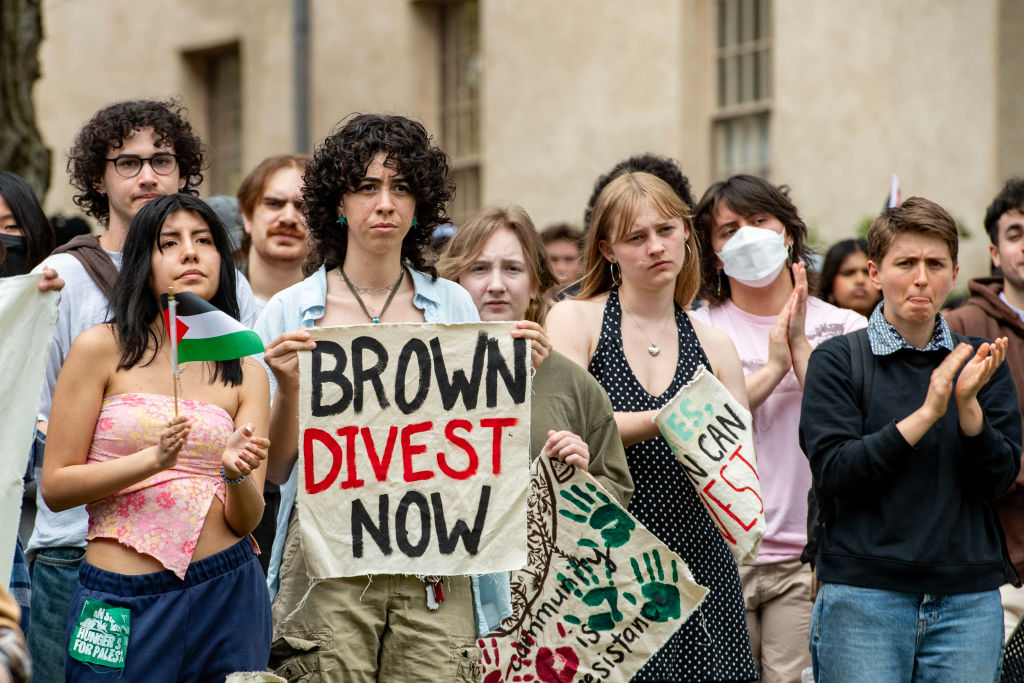Elite US universities are reeling from anti-Israel protests, with suspensions and arrests unfolding across the country. But it could well be argued that these schools have actually incentivised radicalism, including through their own admissions processes.
Columbia protesters who destroyed glass windows and physically confronted a student attempting to block an entrance while taking over a campus building on Monday night were merely reenacting moments from the Ivy League school’s history of unruly demonstrations, which administrators continue to discuss with reverence even as protests run out of control and derail the semester.
In 1968, Columbia protesters occupied several university buildings and engaged in a week-long standoff with police which ended with 700 arrests. It’s a core piece of the school’s identity and ethos, and Columbia’s current leadership takes an obvious sense of pride in that historical moment. Earlier this month, when chaotic protests were already well underway, the university’s president wrote: “Protests have a storied history at Columbia and are an essential component of free speech in America and on our campus.”
The current unrest on American campuses has its roots in a university culture that teaches and rewards radicalism. An anti-Israel student protest leader at the University of Michigan previously won an award from the school for “exemplify[ing] the leadership and extraordinary vision of the Rev. Dr. Martin Luther King Jr”.
One first-year student at Vanderbilt University, having been suspended for shoving a staff member while breaking into a campus building as part of a protest last month, complained of a double standard. The school had previously granted him a scholarship for his essay on high-school walkouts in protest of Ron DeSantis’s supposedly anti-LGBT policies. “Vanderbilt seemed to love that,” he said, according to the AP. “Unfortunately, the buck stops when you start advocating for Palestinian liberation.”
The same AP story mentioned a student at Columbia who believed her arrest was the worst penalty she’d receive for her role in the unruly protests — until she learned she would be suspended, which could follow her for life through her student record. It’s a common theme from student protesters now facing penalties from their schools: a feeling of betrayal that the activist spirit universities once rewarded is not always welcome on campus.
Activism can bolster high-achieving students’ social and academic standing, including through lucrative fellowships. An organisation funded by Left-wing billionaire George Soros, for example, has been paying student activists $3,000 per three-month term to pressure politicians and government entities to cut financial ties with Israel. A job listing for the fellowship asks that applicants be “committed to an abolitionist vision of the future, in which Palestinian people, Black people, brown people, Indigenous people, LGBTQIA+ people, disabled people, immigrants, women, non-binary folks, and all people are free”.
For students passing through elite universities in this climate, and learning at the feet of professors who themselves are supportive of or involved in the protests, disciplinary measures from campus administers likely come as a genuine surprise. For some, activism is what landed them in the Ivy League to begin with.
Top universities make a point of prompting students to discuss their activist aspirations and social justice principles in applications, and those with backgrounds in activism frequently appear to have an advantage over other students.
David Hogg, a former student of Marjory Stoneman Douglas High School, the site of a 2018 mass shooting, gained entry to Harvard despite academic credentials considerably lower than those typical of a student admitted to the university. This came after he rose to national fame for anti-gun activism.
But one needn’t be a famous activist to game the college admissions process. Stanford University has a 4% acceptance rate, but in 2017 the school admitted a student whose application essay simply recited “#BlackLivesMatter” 100 times.
Universities go out of their way to encourage and select for student activism in their admissions processes. The Common App, an application shared by hundreds of universities including all Ivy League schools, prompts students to “reflect on a time when you questioned or challenged a belief or idea… What was the outcome?” So ubiquitous is the social justice and DEI essay prompt for college admissions that it’s sprung up a cottage industry for helping students give precisely the answers administrators are looking for.
Since the Supreme Court blocked affirmative action in college admissions last year, schools have begun using the essay portion of applications as an opportunity for students to highlight their race and ethnicity. For applicants without minority status, the pressure to present oneself as an ally of progressive causes and an agent for change is all the more potent. When these students, encouraged to be activists throughout their academic careers, become campus radicals, the universities only have themselves to blame.











Join the discussion
Join like minded readers that support our journalism by becoming a paid subscriber
To join the discussion in the comments, become a paid subscriber.
Join like minded readers that support our journalism, read unlimited articles and enjoy other subscriber-only benefits.
Subscribe